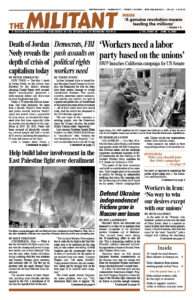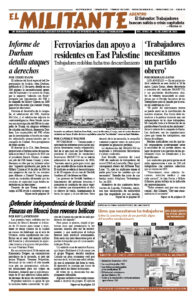June 15, 1998
Working people everywhere should support the fight by 5,300 transit workers in Philadelphia to push back the city government’s attempt to deal blows to the Transport Workers Union.
This fight is another example of the increasing numbers of working people who are willing to fight. They join the ranks of other workers engaged in battles, such as the striking unionists at Titan Tire in Des Moines, and coal miners on strike in western Pennsylvania.
Broader layers of workers want to stand up to the bosses’ demands for “management rights” and other attempts to run roughshod over our wages, working conditions, and rights. Many working people can identify with the opposition to the two-tier wage system and part-time work. In fighting for greater class solidarity, the transit workers show how all working people can defend our interests.
June 15, 1973
LOS ANGELES — King-sized border patrol vans are cruising the main streets of Chicano barrios here. They pull up at bus stops and simply arrest people unable to produce proof of citizenship or legal residency. Immigration patrol squadrons comb the sweatshops of the garment district, taking out workers without papers. In a 10-day period nearly 3,000 people have been dumped across the border.
The central force in the efforts to stop the roundups is CASA Hermandad General de Trabajadores. Leader Bert Corona urged massive marches, demonstrations, and other protests against the Immigration and Naturalization Service.
He expressed the hope that all working people would see the need to come to the defense of the Spanish-speaking and other foreign-born being victimized. “We can’t let them divide us by going first after one group, then another.”
June 14, 1948
While Hitler’s barbarous uprooting of whole peoples in Europe is generally known to the public, not much attention has been paid to a similar page in recent American history. This was the shameful forced evacuation of 120,000 persons of Japanese ancestry from the Pacific coast and Alaska in 1941.
Americans of Japanese descent were torn from their homes, shipped to concentration camps and separated from their families. They could take with them only those possessions they could carry on their persons.
Real estate and business interests put the pressure on the Army to deport the Americans of Japanese descent. While they were incarcerated in the “relocation” camps their farms were sold for unpaid taxes, furniture seized for unpaid rents, their once-flourishing businesses in wholesale fruits, vegetables and fishing were seized by competitors.

